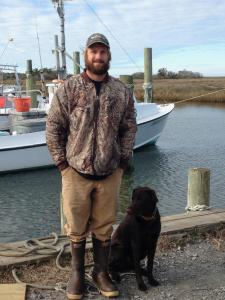Kelsey Aiken

Young Fishermen in the Northeast United States
Interviews with 39 fishers between the ages of 18-35, located along the US East Coast from Maine to North Carolina. Collectively, they represent a wide variety of gear types and fisheries. All had been fishing full-time for at least two years and wanted to make fishing their career. They describe motivations for choosing a fishing career, strategies used, barriers encountered, and facilitating factors that have enabled interviewees to defy the graying trend to become successful fishermen.
Please visit the Voices SoundCloud page to explore clips and stories that relate to this collection.
Sarah Schumann
Kelsey Aiken, 29 years old at the time of the interview, is a fisherman and co-manager (along with his brother) of a fish packing house in Hatteras, NC founded by his father. The company focuses mainly on gillnet fishing for flounder and sells a range of seafood caught in the Pamlico Sound and the ocean to a variety of markets, including New York's Fulton Fish Market, Boston, Canada, California, and local outlets.
Scope and Content Note
In his interview, Kelsey talks about transitioning the business from father to sons and his dreams of adding a retail operation to the business. Kelsey describes participating in North Carolina Sea Grant's Fish Camp program, where he was inspired to attend his state's general assembly and speak to policy makers about the value of commercial fisheries. He describes this eye-opening experience and stresses the importance of young fishermen getting involved in advocacy.
Aiken highlights the ways in which the commercial fishing landscape in Hatteras has transformed over time. Aiken mentions regulatory challenges, such as changes in net sizes, fishing seasons, and catch limits that have frustrated many fishermen, some of whom have chosen to leave the industry. Furthermore, he highlights how climate change and regulatory alterations have affected fish availability and the fishing industry's predictability. Kelsey goes on to stress the adaptability required by those in the fishing industry to navigate these changes and uncertainties.
“There was quite a few kids from down here that went to Raleigh with us and were able to speak to some representatives and senators and stuff like that. They weren’t beat down by the end of that. They were kind of like, 'Wow, they did listen to us.' You know? I feel like it’s getting the right information to them at the right time, before their picture is already skewed... That’s what most of them said. 'Wow, I didn’t know that.'”
Please Note: The oral histories in this collection are protected by copyright and have been created for educational, research and personal use as described by the Fair Use Doctrine in the U.S. Copyright law. Please reach out Voices@noaa.gov to let us know how these interviews are being used in your research, project, exhibit, etc. The Voices staff can help provide other useful resources related to your inquiry.
The NOAA mission is to understand and predict changes in climate, weather, oceans, and coasts, to share that knowledge and information with others, and to conserve and manage coastal and marine ecosystems and resources. The Voices Oral History Archives offers public access to a wide range of accounts, including historical materials that are products of their particular times, and may contain offensive language or negative stereotypes.
Voices Oral History Archives does not verify the accuracy of materials submitted to us. The opinions expressed in the interviews are those of the interviewee only. The interviews here have been made available to the public only after the interviewer has confirmed that they have obtained consent.
